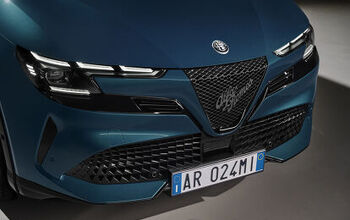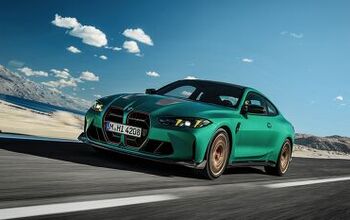Sergio Warms up to Electrification, Even As FCA's Light-duty Diesels Get the Green Light

It’s no secret that hybrids and fully electric vehicles are about as appealing to Fiat Chrysler Automobiles CEO Sergio Marchionne as a crisp, button-up shirt. The FCA boss once famously railed against his company’s sole electric offering — the tiny, money-losing Fiat 500e — for losing $10,000 for every unit sold. Placating California doesn’t come cheap.
Still, Marchionne isn’t alone in distrusting the plug. Subaru and Mazda have shown a similar aversion to electrification, though even those automakers concede it’s a losing battle. In a conference call with investors late last week, Marchionne admitted defeat, outlining a plan to add electric motors to a significant chunk of FCA’s fleet in the coming years. One division stands to go the way of Volvo, with electric motors planned for each new car introduced after 2019.
What prompted the shift in thinking? Diesel, and the public’s growing distrust in compression-ignition engines.
While Marchionne’s plan isn’t yet fleshed out on paper — a five-year plan bows early next year, covering the company’s product timeline through 2022 — the investor’s call counts as an official beginning.
“What makes [electrification] mandatory now is the fate of diesels,” he said, noting the growing crackdown by various regulators on the technology. “We have been reluctant to embrace that avenue until we saw clearer the path forward.”
The Environmental Protection Agency delivered a big wake-up call back in January, denying certification for U.S.-market Jeep Grand Cherokee and Ram 1500 models powered by the 3.0-liter EcoDiesel. A Justice Department lawsuit ensued. Only on Friday did the EPA relent, granting certification to 2017 models equipped with revised emissions software.
It’s not just regulators with fine-toothed combs weighing on Marchionne’s mind. Jurisdictions around the globe have soured on diesels, with several European cities planning a ban of oil burners in the near future. The writing’s on the wall. The company needs to look elsewhere for fuel economy and emissions savings.
Despite the company’s new direction, the same fears persist. One reason Marchionne shied away from electrification in the past was the technology’s high development cost, and he’s still not confident the company won’t get burned.
“If the cost of batteries doesn’t come down, there will be a huge increase in pricing in 2022 and that will cause shrinkage in demand,” Marchionne told investors.
Besides the recently introduced Chrysler Pacifica Hybrid minivan, the next “regular” FCA vehicle destined for the hybrid treatment is the next-generation Jeep Wrangler (though talk of this version seems to have dried up in recent months). Expect plenty more where this came from. While FCA’s five-year plans have proven notoriously variable, Marchionne claims 50 percent of the company’s lineup will feature some form of electrification by 2022.
At Maserati, however, that number should hit 100 percent, and much sooner. The luxury halo brand will adopt electrification on a mass scale, he said, with nearly all of its R&D dollars funneled into electric powertrain development. Whether it’s hybrid variants of existing products, such as the Levante SUV, or all-electric sports cars, like the Alfieri concept car-inspired roadster anticipated for 2020, all Maseratis will boast some measure of electric propulsion in two short years.
It remains to be seen where FCA takes the strategy on the low end of its product range, especially in North America. Lately, the automaker’s biggest investments involve the production of new generations of the Ram 1500 pickup and Wrangler. Profitable and popular, but hardly green vehicles. Assuming stable gas prices, it’s hard to see much demand for low-volume hybrid versions of these utilitarian vehicles.
Global products like Jeep’s Compass, on the other hand, almost scream for a competitive hybrid variant.
[Sources: Wards Auto, Autocar] [Image: Fiat Chrysler Automobiles]

More by Steph Willems
Latest Car Reviews
Read moreLatest Product Reviews
Read moreRecent Comments
- Tassos Under incompetent, affirmative action hire Mary Barra, GM has been shooting itself in the foot on a daily basis.Whether the Malibu cancellation has been one of these shootings is NOT obvious at all.GM should be run as a PROFITABLE BUSINESS and NOT as an outfit that satisfies everybody and his mother in law's pet preferences.IF the Malibu was UNPROFITABLE, it SHOULD be canceled.More generally, if its SEGMENT is Unprofitable, and HALF the makers cancel their midsize sedans, not only will it lead to the SURVIVAL OF THE FITTEST ones, but the survivors will obviously be more profitable if the LOSERS were kept being produced and the SMALL PIE of midsize sedans would yield slim pickings for every participant.SO NO, I APPROVE of the demise of the unprofitable Malibu, and hope Nissan does the same to the Altima, Hyundai with the SOnata, Mazda with the Mazda 6, and as many others as it takes to make the REMAINING players, like the Excellent, sporty Accord and the Bulletproof Reliable, cheap to maintain CAMRY, more profitable and affordable.
- GregLocock Car companies can only really sell cars that people who are new car buyers will pay a profitable price for. As it turns out fewer and fewer new car buyers want sedans. Large sedans can be nice to drive, certainly, but the number of new car buyers (the only ones that matter in this discussion) are prepared to sacrifice steering and handling for more obvious things like passenger and cargo space, or even some attempt at off roading. We know US new car buyers don't really care about handling because they fell for FWD in large cars.
- Slavuta Why is everybody sweating? Like sedans? - go buy one. Better - 2. Let CRV/RAV rust on the dealer lot. I have 3 sedans on the driveway. My neighbor - 2. Neighbors on each of our other side - 8 SUVs.
- Theflyersfan With sedans, especially, I wonder how many of those sales are to rental fleets. With the exception of the Civic and Accord, there are still rows of sedans mixed in with the RAV4s at every airport rental lot. I doubt the breakdown in sales is publicly published, so who knows... GM isn't out of the sedan business - Cadillac exists and I can't believe I'm typing this but they are actually decent - and I think they are making a huge mistake, especially if there's an extended oil price hike (cough...Iran...cough) and people want smaller and hybrids. But if one is only tied to the quarterly shareholder reports and not trends and the big picture, bad decisions like this get made.
- Wjtinfwb Not proud of what Stellantis is rolling out?


































Comments
Join the conversation
When interviewed at the Hungarian F1 race, he hinted that Maserati would be the electric brand within the FCA stable.
Maybe he should focus on making reliable vehicles before jumping to more hybrids or EV.